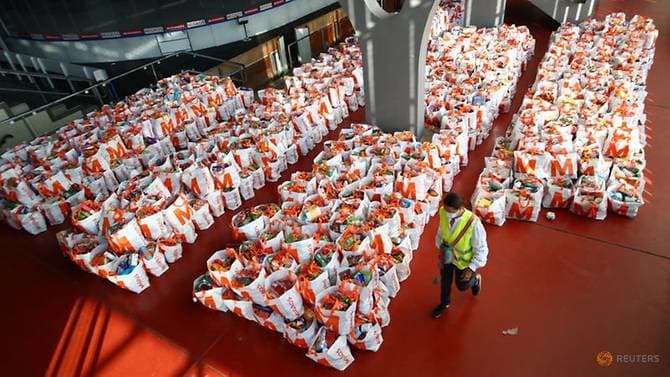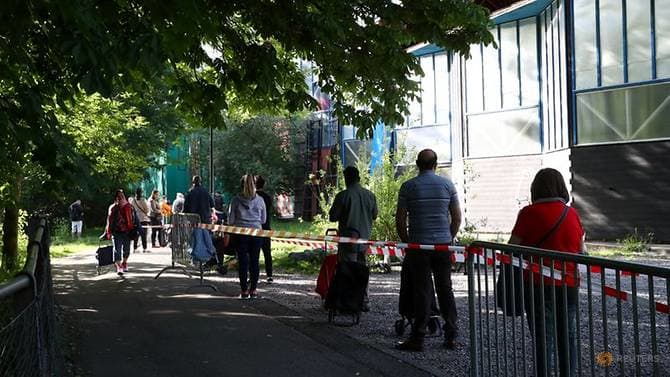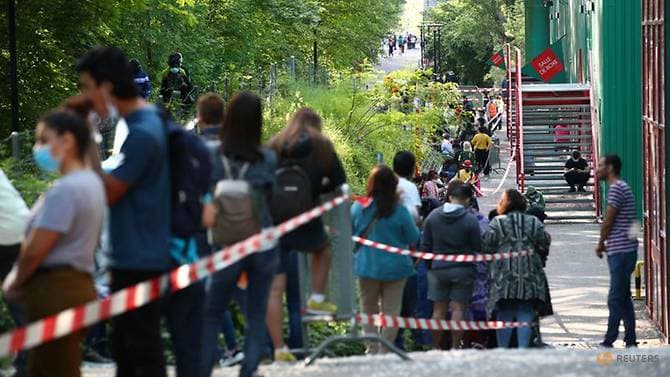More than 1,000 people queued up on Saturday, May 9, to get free food parcels in Geneva, underscoring the impact of the coronavirus epidemic on the working poor and undocumented immigrants even in wealthy Switzerland.
The line of people stretched for more than 1km outside an ice rink where volunteers were handing out around 1,500 parcels to people who started queuing as early as 5am.
"At the end of the month, my pockets are empty. We have to pay the bills, the insurance, everything," said Ingrid Berala, a Geneva resident from Nicaragua who works part-time. "This is great, because there is food for a week, a week of relief ... I don't know for next week."

In a nation of nearly 8.6 million, 660,000 people in Switzerland were poor in 2018, charity Caritas says, particularly single parents and those with a low level of education unable to find work after losing a job.
More than 1.1 million people were at risk of poverty, which means they have less than 60 per cent of the median income, which was 6,538 Swiss francs (US$6,736) for a full-time job in 2018.
Swiss bank UBS has calculated that Geneva is the second-most expensive global city for a family of three to live in, behind only Zurich. While average incomes are also high, that helps little for people struggling to make ends meet.
"I think a lot people are aware of this, but it is different to see this with your own eyes," said Silvana Matromatteo, head of the aid group Geneva Solidarity Caravan.
"We had people in tears who said 'It is not possible that it is happening in my country'. But it is here and maybe the COVID-19 brought everything out and this is good, because we will be able to take measures to support all these workers, because they are workers above all."
Patrick Wieland, chief of mission for the Doctors Without Borders group, said a survey last week showed just over half the food recipients interviewed were undocumented, while others had attained legal status, were Swiss or were seeking asylum.
Just over 3 per cent had been tested positive for COVID-19, three times the overall rate in Geneva, which he attributed to poor and overcrowded housing.
"In Geneva, one of the richest cities in the world, there have always been people living precariously, especially all the people who work as housekeepers, in agriculture, on construction sites or in hotels, and they found themselves overnight without a job because of COVID-19," he said.

One illegal immigrant who called himself Fernando said he lost his restaurant job during the crisis and had no pay.
"I'm very grateful to receive this help and if the situation changes for me, I am committing to do the same thing that they are doing for me," he said.
Latest Stories
-
‘I won’t fall with you’ – John Jinapor says he’ll fire non-performing ECG CEO to save himself
31 minutes -
Defence Minister commissions refurbished medical services headquarters at Burma Camp
35 minutes -
Prof Kwesi Yankah: Kofi Akpabli wounds my pride as a Ghanaian
52 minutes -
King sends heartfelt message to fellow cancer patients
1 hour -
Meta warns of ‘worse’ experience for European users
1 hour -
Trump tells business chiefs he needs ‘little bit of time’ as US economy shrinks
2 hours -
‘When the lights go off, people must move’ – Energy Minister warns ECG over ‘unacceptable’ delays
2 hours -
Energy Minister faults ECGs communication breakdown, calls for overhaul in customer service
2 hours -
‘We inherited a crisis’ – Energy Minister pins load shedding on NPP administration
3 hours -
‘I know it’s not easy, but I’m not here to complain’ – Energy Minister vows to fix power woes
4 hours -
‘When the lights go out, so does public patience’ – Energy Minister admits fault, promises fix
4 hours -
Youth urged to take advantage of opportunities in rice value chain
5 hours -
‘I’ve learned some very bitter lessons’ – John Jinapor cites 2016 as lesson on power failures
6 hours -
Katy Perry felt ‘battered and bruised’ by backlash
7 hours -
‘I cannot accept that lights go off when it rains; that makes no sense,’ – Energy Minister
7 hours

